Develop Stances: G3
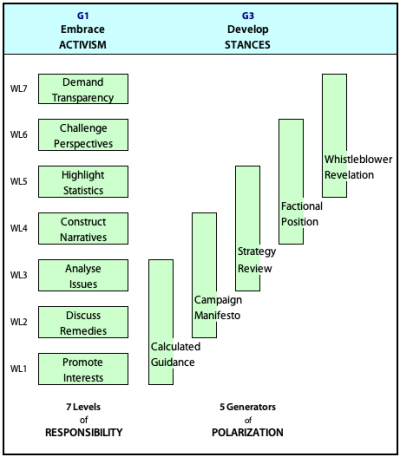
Triads
Once to accounts of institutional situations is in place, interested parties and factions within society seek to gain some control over how matters evolve.
The institution is a complicated system set in a complicated historical juncture, with multiple divergent stakeholders. Each faction then finds it necessary to systematize and consolidate what is known, believed and assumed into that can be disseminated within society and drive support. This appears to be achieved by adding a third level to form with the quality of that level being thoughtfulness.
The inevitable effect of divergent stances is to reinforce divisions and create .
Generators of Polarization
Whistleblower Revelation (G35)
A whistleblower, in speaking out publically and fervently, highlights a particular damning , and generates an immediate and thoughtful in relation to those claims. The whistleblower is challenging the current that holds the revelation is unnecessary or inappropriate or taken out of context.
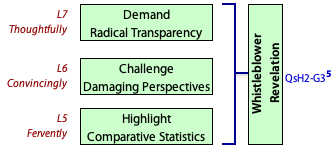
Consultation:The whistleblower may discuss with trusted colleagues, or a legal advisor.
Dissemination: Uses the media.
Benefits: Exposure of wrong-doing and enforcement of accountability.
Criticisms: Whistleblowers, however, ethical and valuable their message, are typically criticized:
- for breaching loyalty and trust
- for disrupting the organisation or department
Misuse: For self-aggrandisement, self-publicity, settling scores.
Factional Position (G34)
Factions address issues within societal institutions by applying their intrinsic in a thoughtful way, buttressing this with convincing , and fervently promoting a particular .
More down-to-earth details are left for the (see below).
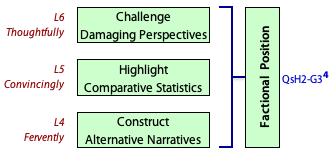
Consultation: Limited to known and active members of the faction.
Dissemination: Uses conferences and mail-outs to members.
Benefits: Allows an ideology-based group to enter public debate.
Criticisms: Distorts the reality.
Misuse: Perverts the truth, confuses the public and whips up emotion counter-productively.
Strategy Review (G33)
A is commonly used by investigative journalists and by governments, because it appears to be the most neutral way to develop a stance. The review is based on a fervent , a convincing and a thoughtfulselection of .
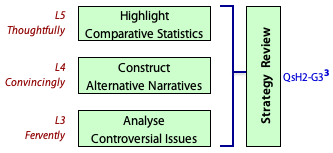
Consultation: May be a period of public involvement before or after the review is completed and published.
Dissemination: Production of a report and promotion via the media
Benefits: A rational account of some aspect of the institution that lends itself to critiques and potential improvement.
Criticisms: Strategy reviews are typically criticized as lacking in detail as to implementation of improvements.
Misuse: Deliberate bias by journalists. Decisions related to the strategy have already been taken by the government agency and the review is window-dressing.
Campaign Manifesto (G32)
Campaign manifestos promote particular fervently, based on a convincing , and a thoughtfully constructed .
They are in harmony with the through sharing and building upon a particular narrative.
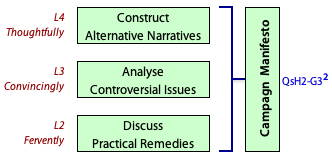
Consultation: Discussion amongst factional members and active campaign supporters.
Dissemination: Production of a report and promotion via conference events.
Benefits: Delivers concretely on the factional position.
Criticisms: Dependent on the particular narrative that has been constructed or appropriated.
Misuse: Actively damages the social fabric if the factional positions is deliberately harmful.
Calculated Guidance (G31)
fervently which is believed to be widely held, convincingly that are believed to be practical, and thoughtfully .
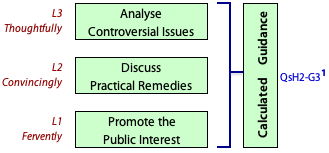
Consultation: None, but draws on opinion polls or focus groups.
Dissemination: Social media, conferences, public speaking, media interviews.
Benefits: Appears to be rational and provides simplicity and clarity for members of the public..
Criticisms: The analysis is often faulty, partial or dishonest.
Misuse: To whip up an emotional state that prevents rational consideration of the issue.
Schema
Function:
To provide a foundation of ideas for improvement that can engender support from wider society.
Quality: Thoughtful i.e. use of reason and understanding to strengthen importance and belief
Integration within the Group: A multiplicity of situations are subsumed with the top level (g3) providing a coherent and rationalized context, the bottom level (g1) providing justification, with the middle level (g2) as the focus for convincing.
Integration across the Groups: Upper and lower groups appear more detailed and moving towards the central group the stance is broader and more general.
Psychological Correlate: The hope for something better combined with scepticism that these stances are a recipe for improvement.
Institutional Tension: Long term implications with so many unknown factors in the future create concerns about the value of the stances.
Practical Implications: Potentials for corruption and institutional damage emerge.
Transition
The stance may be developed and organised as a phenomenon in society, but just as required for effect, so any requires some sort of public endorsement for effectiveness.
This can be provided by adding a 4th level to create tetrads which are coherent for the institution to which the stance applies, and where public consent may be expected.
- Continue with Scenarios-G4 Tetrads.
- Go to the review section to see the full picture in more detail.
Originally posted: 18-Mar-2024